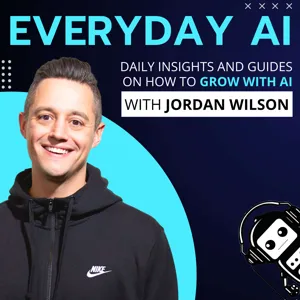Podcast Summary
Crafting Precise Prompts for AI Models: Invest time in creating clear, complete, and well-structured prompts for AI models to ensure accurate and useful results.
Crafting well-defined prompts is essential when working with AI models like ChatGPT. The prompt acts as a recipe, shaping the output just as ingredients influence the taste of a dish. If you want to achieve accurate and useful results, invest time in building an assistant or system to help create precise prompts. The quality of your input directly impacts the quality of the output. As Dietmar explained, AI models don't understand the prompts in the same way humans do, but they do respond based on the information provided. So, to get the best results, make sure your prompts are clear, complete, and well-structured. The phrase "garbage in, garbage out" summarizes this concept well. If you put poorly thought-out or incomplete prompts into the system, you'll get subpar results. Remember, the more time and effort you put into crafting a good prompt, the better the output will be.
Assigning an assistant role to a language model enhances its responses: By assigning an assistant role to a language model, it can access relevant data and alter the prompt, resulting in more effective and nuanced responses
Assigning an assistant role to a language model like ChatGPT significantly improves the quality of the output. This small adjustment allows the model to retrieve relevant data from its database, altering the flavor of the response. For instance, when asked to write a polite negative reply to an unfriendly customer email, the assistant role changes the prompt, leading the model to access data related to competence in customer support and friendliness. This results in a more effective and empathetic response. The assistant role can be any profession or expertise, from a market researcher to a social media manager or even a chef or beekeeper. By assigning an assistant role, we can harness the model's capabilities to generate more nuanced and accurate responses. This simple yet powerful technique can save time and effort while improving the overall quality of the output.
The Role of Assistants in Writing Processes: As technology advances, writing assistants like Professor Synapse and Microsoft's Copilot can help streamline the writing process. However, for complex tasks, a human-generated or handwritten assistant may still be the best option.
As technology advances, we'll see an increase in the availability and use of assistants to help us write and complete tasks. Tools like Professor Synapse and Microsoft's Copilot can create custom assistants and take on a significant role in the writing process. However, for more complex tasks, a handwritten assistant or a highly personalized, human-generated assistant may still be the best option. It's important to remember that while these tools can make writing easier, only you truly understand your specific needs and goals. Therefore, it's essential to strike a balance between using technology and relying on your own abilities. As we continue to explore and utilize these tools, we'll likely see a shift towards more efficient and effective writing processes. And don't forget, always rate, review, and subscribe to help support the creators of these resources.





